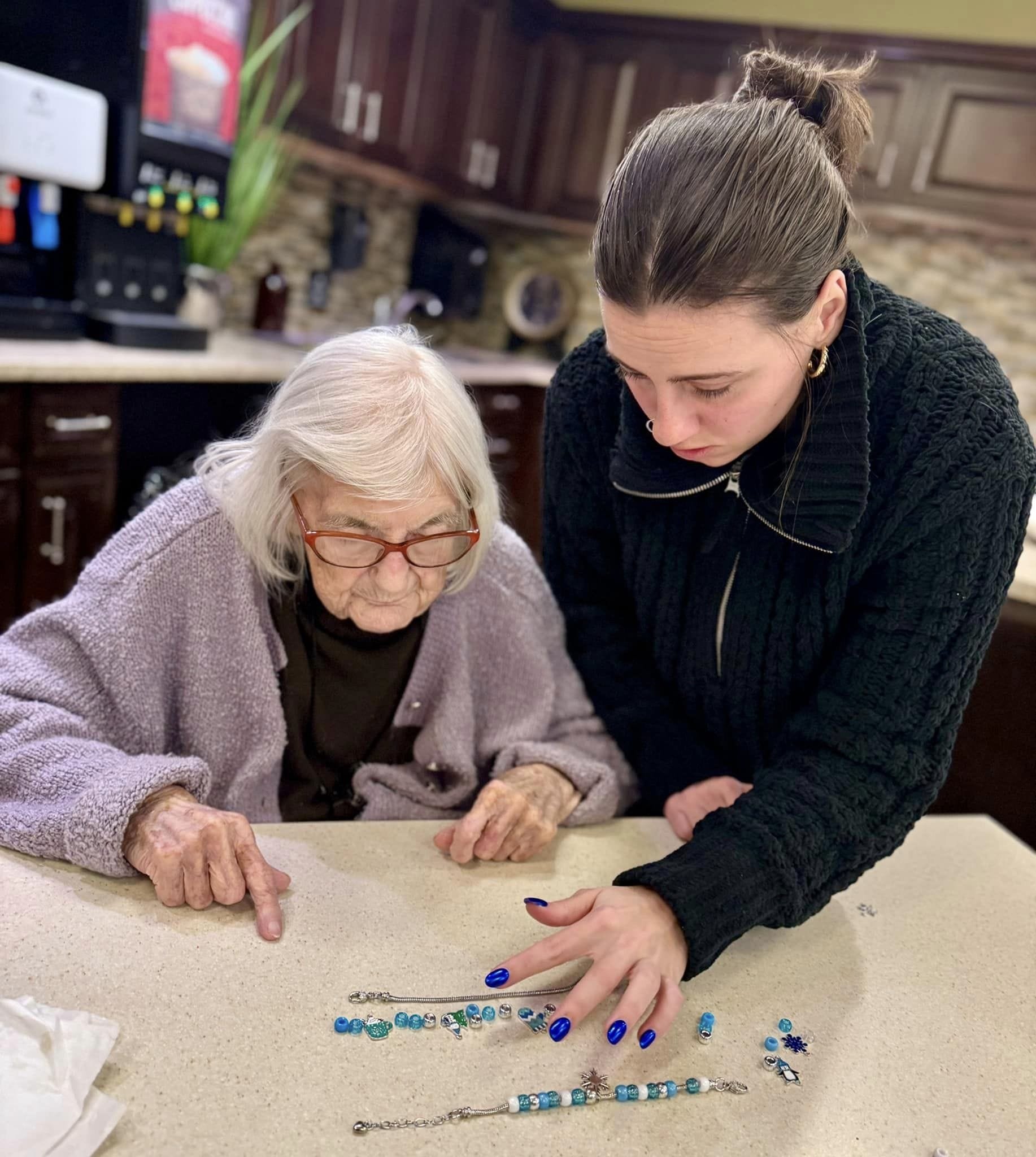Assisted living vs. memory care: finding the right help and housing as we age can be a challenge. With so many assisted living solutions available — from skilled nursing to home care to memory care — knowing which is the best option can be tough.
But, finding the right amenities, services, staff, and level of care doesn’t need to cause headaches. When you have the right team, picking the right assisted living or memory care facility is a matter of calling a senior living professional.
That’s where we come in. We’re Village Walk, a senior living facility offering assisted living and memory care solutions for seniors and families.
For more than 30 years, our expert-trained staff have helped seniors and families make the transition to assisted living and memory care.
Seniors and families: if you’ve ever wondered what the difference is between assisted living and memory care, you’ve come to the right place.
Rest easy; we’re here for you. Join us as we explore the five main differences between assisted living and memory care.
5 differences between assisted living vs. memory care
When discussing assisted living and memory care, let’s note their similarities. Both assisted living and memory care facilities offer help with activities of daily living.
Whether taking and managing medication, receiving help with meals, or cleaning around the house, both assisted living and memory care facilities provide individualized personal care for seniors who need help living a life of independence and grace.
Memory care facilities boast specialized environments, security, and staff for people living with dementia. Memory care programs are best suited for seniors with memory loss or dementia.
Finally, memory care offers an extra level of care. Memory care facilities support seniors with memory conditions and other memory impairments.
When it comes to life care, the key difference between memory care vs. assisted living lies in the scope and depth of services provided. The five main differences between assisted living and memory care lie in the following:
- The staff
- The safety measures
- The amenities at each living facility
- The activities and care programs provided
- The cost of care services and/or full-time care provided
We’ll dive into each of these topics in the rest of this article.
1. The staff: training and level of care provided
At assisted living and memory care communities, staff are exceptional at what they do. Both facilities often hire enrichment directors and therapists to provide holiday activities
and physical therapy for seniors.
At memory care facilities, staff provide dementia care and round-the-clock support.
Since people with dementia often need more support and oversight, memory care tends to have a higher staff-to-resident ratio. The staff at a memory care or dementia care facility provide compassionate support to prevent dementia-related behaviors such as wandering, confusion, and aggression.
At Village Walk’s assisted living and memory care facilities, our staff are trained to encourage residents to be as independent as possible. When you partner with us, we’ll always maintain direct and open lines of communication with you.
That way, you know you’re receiving the best help you and your loved one can get for your needs. Speaking of help, let’s take a look at safety, the topic of our next section.
2. The safety: security features (and more)
From assisted living to memory care, the staff at both facilities believe safety is paramount to your loved one’s health and happiness. Most assisted living communities offer the following safety features:
- In-room emergency alert systems
- Daily staff check-ins
- 24-hour on-site security personnel
What’s more, memory care facilities also boast the following added security features:
- Locked entrances and exits
- A keypad-based entry and exit system
- Doorbells to signal entering and exit
- Color-coded hallways for ease of reference for seniors with memory loss
- Memory boxes designed to help residents feel more at home
In memory care facilities, the facility layouts are designed to help decrease confusion, create a feeling of calm, and decrease confusion. The above-mentioned safety features can help seniors from all walks of life to reduce the chances of injury, aggression, and anxiety throughout the day.
You’ll soon discover in the next section that amenities play an important role in ensuring both the safety and satisfaction of seniors in memory care and assisted living facilities.
3. The amenities: unique layouts and offerings
Amenities can make or break a senior’s experience in a memory care or assisted living facility. While amenities may vary from one community to the next, most assisted living and memory care facilities include amenities revolving around meals, recreation, and life enrichment.
For instance, at Village Walk, our assisted living and memory care units include:
- A family-style appointed formal dining room
- Casual bistro with adjoining patio
- Comfortable pub for gathering with friends
- Convenient internet lounge
- Theater for movies and entertainment
- Robust creative arts studio
- Rooftop observation deck with adjacent sunroom
- Hair styling salon
- South shore waterfront access
- Instant access to public transportation such as trains, buses, the ferry, and the interstate highway
Like other memory care facilities, Village Walk also allows seniors to bring their pets with them. In most assisted living and memory care facilities, seniors can bring pets with them to ensure comfort and peace of mind.
While memory care and assisted living communities both provide a calendar of events and entertainment to provide an enriching living experience for seniors, only memory care facilities provide activities that are designed to help manage and better live with memory loss.
Hop aboard as we’ll discuss some of those activities in the next section.
4. The activities: therapies, events, and more
Most assisted living facility staff members organize activities and social occasions to appeal to seniors’ hobbies and interests.
An example of some of these activities include:
- Exercise and dance classes
- Book clubs
- Games
- Themed parties and get-togethers
- Outings to local restaurants, museums, shopping, and historical landmarks
- And much more
At memory care facilities, activities tend to be more structured, include more sensory stimulation, and help cultivate mindful engagement for residents.
Most memory care facilities offer therapeutic activities, such as:
- Music therapy
- Art therapy
- Reminiscence therapy
- Pet therapy
Whether exploring equine therapy, completing paintings, trick or treating, or attending the local Pride parade, our assisted living and memory care staff take great pains to ensure the safety, well-being, and happiness of all residents.
Did you know?
Did you know that many assisted living and memory care facilities create activities that bring together assisted living and memory care residents? Check out our recent outing to the zoo!
5. The cost: monthly rates explained
Since residents in an assisted living facility may be at the beginning stages of dementia, residents may also benefit from moving to a memory care facility if their condition progresses. The cost of these communities can differ.
Factors that affect the cost of a care community include the 4 W’s and 1 H:
- Which type of facility your loved one live in (e.g. assisted living, memory care, or assisted living with memory care)
- Who your loved one is sharing their room with (e.g. living in a shared or private residence)
- Where the facility is located (e.g. in an urban or more rural area)
- What type of services your loved one receives (e.g. round-the-clock or as-needed care)
- How large their room is (e.g. the type of floor plan you and your loved one choose)
Looked at another way, the cost of assisted living and memory care can be broken down into:
- Room and board
- Meals and snacks
- Activities
- Housekeeping and laundry
- Transportation to and from appointments
Memory care tends to differ in cost in that residents need more help with activities of daily living. Residents tend to receive more specialized care and services than assisted living residents.
For this reason, you can expect to pay more for memory care than assisted living.
Bonus: The community aspect
We’d be remiss if we didn’t mention that assisted living and memory care facilities differ from other independent living communities such as continuing care retirement communities (CCRCs), home care, and skilled nursing homes.
While memory care facilities tend to offer more hands-on support than assisted living facilities, both care options give residents the chance to build rapport and community with staff, residents, and local community establishments.
At some independent living facilities, assisted living and memory care come as a package deal. For example, at Village Walk, our campus includes an assisted living and memory care unit in one facility.
Seniors and families never need to worry about moving their loved one’s belongings, leaving behind friends, and pausing cherished hobbies due to their loved one’s health. Seniors can move from one unit to the hall of the other unit and maintain the same level of care, rapport, and comfort knowing that they’ll be living in the same building.
While assisted living and memory care may differ in the level of support provided to residents, the emphasis on specialized care is the same. Whether you choose memory care or assisted living, your loved one can experience a community of like-minded individuals and enjoy the best that life can offer.
Find your village with Village Walk Senior Living
The major difference between assisted living and memory care lies in five key areas:
- The staff
- The safety measures instituted
- The amenities at each living facility
- The activities and care programs provided
- The cost of care services and/or full-time care provided
Assisted living facilities may be a solid fit for your loved one if memory loss is in its early stages or is not an issue.
But, if your loved one is prone to wandering, aggression, or confusion, and you feel they may need 24-hour oversight, memory care may be the right solution.
With seniors aged 65 and older making up more than 17% of the total U.S. population as of 2022 according to the Federal Reserve Bank of St. Louis (compared to 9% in 1960), you and your loved one couldn’t have picked a better time to consider assisted living and memory care solutions.
At Village Walk, we’ve identified this trend and met the demand for better independent living options. Our skilled nurses, senior living concierge staff team, enrichment directors, and physical therapists are trained in the latest practices and are familiar with the latest technologies.
With over 30 years of collective experience, our entire village’s goal is to ensure the safety, health, and happiness of both you and your loved one. To get to know and explore our friendly Village, get in touch with us today!
We’d be happy to share all that our village has to offer with you.
Frequently asked questions about memory care vs. assisted living
Who needs assisted living, and who needs memory care?
Assisted living is best for people who need help with activities of daily living. This living option may also be best for people with whom memory loss isn’t yet an immediate concern.
Memory care is a smart choice for people with dementia or other memory loss-related symptoms. People in the later stages of dementia, and people prone to agitation, confusion, wandering, or memory loss can benefit from memory care.
What’s the difference between dementia care and memory care?
They’re one and the same! Dementia care and memory care are two terms for the same type of care.
These care programs refer to senior living communities that support adults living with Lewy body dementia, Alzheimer’s disease, and other memory loss-related conditions.
When’s the right time to consider assisted living and memory care?
If you or your loved one needs help with activities like bathing, grooming, taking medication, attending regular appointments, and general housekeeping, you’ll want to consider assisted living as a viable living option.
But, if you or your loved one begin to experience incontinence, neglect paying bills and regular housekeeping chores, withdraw from social situations, lose track of time, no longer take care of your health, or are prone to frequent trips and falls, memory care may be the right option.
“You don’t have to worry about a thing here at Village Walk.”
“If you’re thinking of retiring — or are retired — come and look at Village Walk. It’s not just a warehouse. And it’s not just a place to put you somewhere.
It’s an enjoyable and pleasant time of our lives. To me, Village Walk is a five-star hotel for seniors where we have entertainment and lots to do. Thank you.” – David G., grateful resident at Village Walk.








